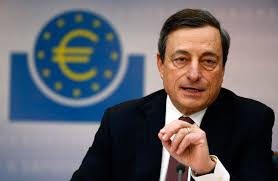European Central Bank President Mario Draghi acknowledged on Thursday that economic growth in the euro zone was likely to be weaker than earlier expected due to the fall-out from factors ranging from China’s slowdown to Brexit
The region’s economy is already suffering its biggest slowdown in half a decade, raising questions over whether the ECB will be able to increase interest rates for the first time in a decade later this year as its current guidance indicates.
The ECB left that guidance and interest rates unchanged at its meeting on Thursday. But Draghi’s downbeat comments, including a reference to “downside” risks, will fuel market speculation that the bank will delay any rate hike, mirroring a more cautious approach by the U.S. Federal Reserve, and may offer new cheap loans to banks.
“The risks surrounding the euro area growth outlook have moved to the downside on account of the persistence of uncertainties,” Draghi told a news conference, citing trade and geopolitical threats and emerging market volatility.
“The near-term growth momentum is likely to be weaker than previously expected.”
His comments pushed the dollar to a more than five-week high against the euro. The single currency was 0.45 percent lower against the dollar at $1.1329, after falling as low as $1.1308, its weakest since Dec. 17.
Despite citing the rising risks, Draghi nonetheless reeled off reasons for not changing policy now, notably the strength of the region’s labor market and rising wage growth, which he said would help push underlying inflation up over the medium term.
“The key factor to assess is the persistence of the uncertainty,” he said, adding he was confident that those uncertainties — ranging from the outcome of Brexit to China’s slowdown and trade protectionism — were being addressed.
“The Governing Council will give itself more time to assess whether all these risk factors have affected confidence and we are going to have another discussion in March when we will also have the new (growth) projections.”
Draghi said the Governing Council was unanimous both in acknowledging the growth slowdown and the factors causing it but some policymakers were less optimistic than others about the economic outlook.
With the ECB already owning a quarter of the euro zone’s outstanding governing debt, analysts were expecting it to turn to other instruments to keep credit flowing.
A new round of cheap multi-year loans to banks, known as Targeted Long-Term Refinancing Operations (TLTRO), was widely seen as the first port of call.
“We do expect an announcement in March that (T)LTROs will be extended, most likely via two-year, variable rate operations,” Frederik Ducrozet, an economist at Pictet Wealth Management, said.
Draghi said on Thursday TLTROs had been raised by several policymakers but no decision had been taken.








